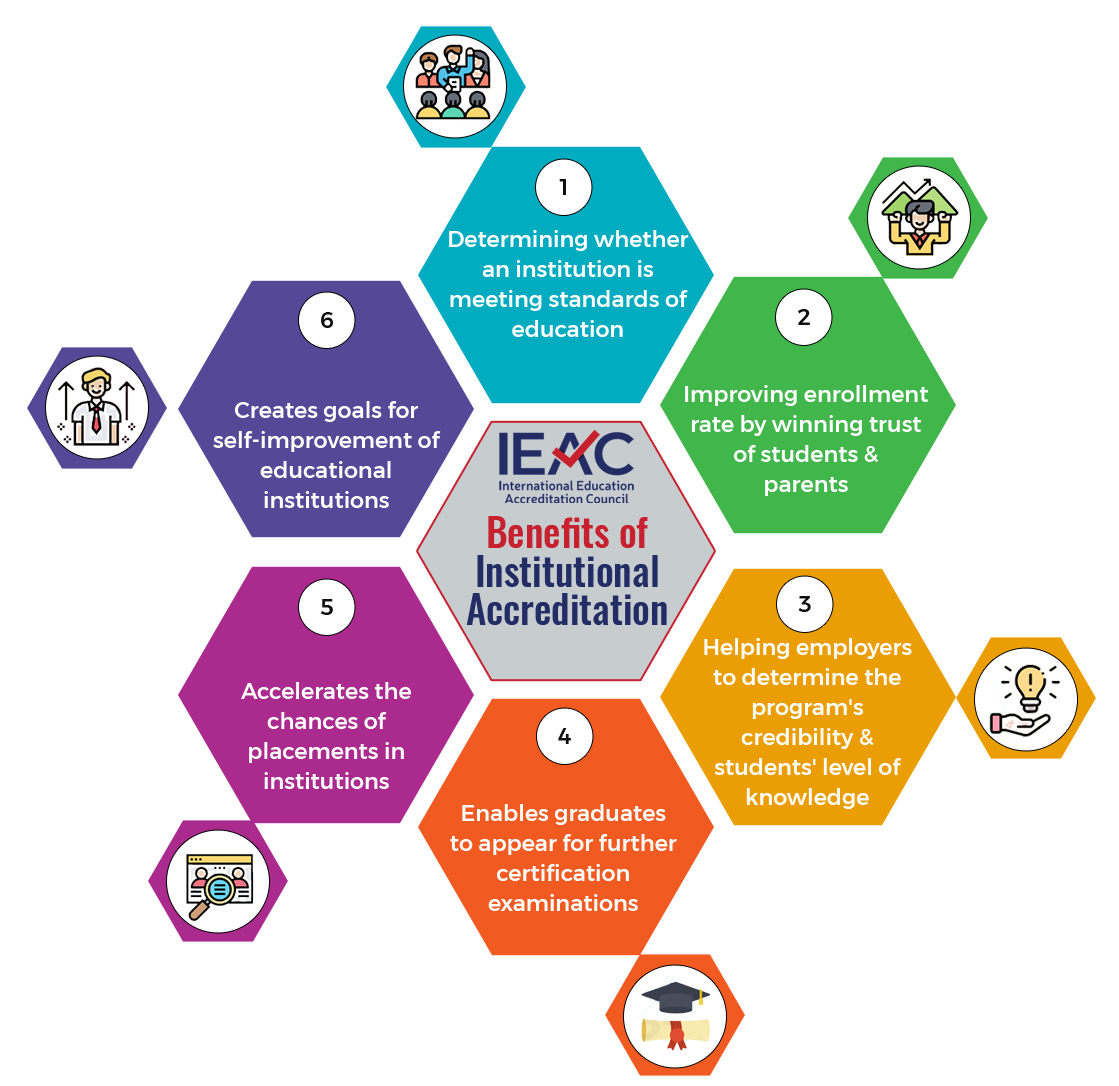- Home
- About IEAC
- Accreditation
- University Accreditation
- College Accreditation
- Online Institution Accreditation
- School Accreditation
- University Recruitment Agency Accreditation
- Programmatic Accreditation
- Teacher/ Lecturer Accreditation
- Religious Institutes Accreditation
- Affiliate Accreditation
- Research Accreditation Candidacy Accreditation
- IEAC Membership
- Institutions Accredited
- Accreditation Process
- Contact Us Webinar Apply Now
Benefits Of Accreditation
Benefits Of Accreditation
Lorem ipsum dolor sit amet, consectetur adipiscing elit, sed do eiusmod tempor incididunt ut labore et dolore magna aliqua. Quis ipsum suspendisse ultrices gravida. Risus commodo viverra maecenas accumsan lacus vel facilisis.
Benefits Of Accreditation – IEAC
Accreditation offers numerous advantages to educational institutions, playing a pivotal role in ensuring and enhancing the quality of education.
Some of the key benefits of accreditation with IEAC:
 Quality Assurance: IEAC accreditation benefits for institutions extend towards acting
as a seal of approval, assuring students, parents, and other stakeholders that your
institution meets or exceeds established standards for quality education. This instills
confidence in the educational process and outcomes.
Quality Assurance: IEAC accreditation benefits for institutions extend towards acting
as a seal of approval, assuring students, parents, and other stakeholders that your
institution meets or exceeds established standards for quality education. This instills
confidence in the educational process and outcomes.  Global Recognition: IEAC accredited institutions gain global recognition for maintaining high standards. This recognition can be crucial for students seeking international opportunities, as employers and educational institutions worldwide often prioritise candidates from accredited institutions.
Global Recognition: IEAC accredited institutions gain global recognition for maintaining high standards. This recognition can be crucial for students seeking international opportunities, as employers and educational institutions worldwide often prioritise candidates from accredited institutions.  Access to Funding: One of the benefits of institutional accreditation is that you may receive opportunities to receive funding, including government grants and private foundations, which often require institutions to be accredited. Your IEAC accreditation demonstrates your institution's commitment to quality education, which could make it more eligible for financial support.
Access to Funding: One of the benefits of institutional accreditation is that you may receive opportunities to receive funding, including government grants and private foundations, which often require institutions to be accredited. Your IEAC accreditation demonstrates your institution's commitment to quality education, which could make it more eligible for financial support. Student and Faculty Recruitment: Your IEAC accreditation enhances your institution's appeal to prospective students and faculty. It serves as a reliable indicator of the institution's commitment to academic excellence and provides a competitive edge in attracting top-tier talent.
Student and Faculty Recruitment: Your IEAC accreditation enhances your institution's appeal to prospective students and faculty. It serves as a reliable indicator of the institution's commitment to academic excellence and provides a competitive edge in attracting top-tier talent.

 Continuous Improvement: The IEAC accreditation process involves self-assessment and external evaluation, leading to a continuous improvement cycle. Institutions are encouraged to identify areas for enhancement and implement changes, fostering a culture of ongoing self-reflection and improvement.
Continuous Improvement: The IEAC accreditation process involves self-assessment and external evaluation, leading to a continuous improvement cycle. Institutions are encouraged to identify areas for enhancement and implement changes, fostering a culture of ongoing self-reflection and improvement. Transferability of Credits: Accreditation facilitates the smooth transfer of credits between institutions. Students from accredited institutions often find it easier to continue their education at other accredited institutions, both domestically and internationally.
Transferability of Credits: Accreditation facilitates the smooth transfer of credits between institutions. Students from accredited institutions often find it easier to continue their education at other accredited institutions, both domestically and internationally. Alignment with Industry Standards: Accredited programs are typically aligned with industry standards, ensuring that graduates possess the knowledge and skills needed to meet professional demands. This alignment enhances graduates' employability and contributes to a positive institutional reputation.
Alignment with Industry Standards: Accredited programs are typically aligned with industry standards, ensuring that graduates possess the knowledge and skills needed to meet professional demands. This alignment enhances graduates' employability and contributes to a positive institutional reputation. Legal Compliance: One of the major Benefits of Accreditation for Higher Education is that accredited institutions will comply with legal and regulatory requirements. This not only ensures theinstitution's legitimacy but also safeguards the rights and interests of students and other stakeholders.
Legal Compliance: One of the major Benefits of Accreditation for Higher Education is that accredited institutions will comply with legal and regulatory requirements. This not only ensures theinstitution's legitimacy but also safeguards the rights and interests of students and other stakeholders.
Other Specific Benefits of IEAC Accreditation Assistance with developing your World University ranking and QS star rating
Assistance with developing your World University ranking and QS star rating  Institutional capacity building.
Institutional capacity building.  Gaining various ISO certifications, which may be built into your IEAC accreditation.
Gaining various ISO certifications, which may be built into your IEAC accreditation.  Partnership development.
Partnership development.  Invitations to our free monthly webinars.
Invitations to our free monthly webinars.  Reduced delegate fees at the IEAC regional and international conferences
Reduced delegate fees at the IEAC regional and international conferences
In summary, there are numerous Academic Accreditation Benefits of the IEAC accreditation as it provides a comprehensive framework for quality assurance, global recognition, financial support, talent attraction, continuous improvement, credit transferability, alignment with industry standards, and legal compliance, making it a crucial component for the success and sustainability of educational institutions.
Who Can Be Accredited?
IEAC has inspectors from all education pathways and are able to accredit primary and secondary education providers, vocational colleges, individual university faculties and/or programs or universities as a single entity. In addition, IEAC can assist private companies that have a teaching and learning section or department.
